A class-action lawsuit has been filed against luxury brand Hermès, alleging that the company engages in the practice of “tying,” requiring customers to purchase ancillary products before being given the opportunity to buy highly-coveted Birkin or Kelly bags. The lawsuit claims that this practice violates antitrust laws and is unfair and anti-competitive, inviting other frustrated consumers to join the cause to have the right to purchase these super-expensive handbags in the open market. Hermès has not yet commented on the lawsuit but has stated in the past that it strictly prohibits such practices.
The lawsuit has prompted Hermès to hire a powerful antitrust legal team to defend the case. The plaintiffs, represented by Haffner Law and Setareh Law Group, allege that Hermès restricts the sale of Birkin bags to its stores and only shows them to selected consumers in private viewing rooms. Sales associates are claimed to be directed to offer Birkin bags only to customers with an established history of purchases or who have met certain purchasing thresholds for ancillary products. The filing also reveals that sales associates receive commissions based on the products sold, with no commission earned for Birkin bag sales.
While Hermès has not formally codified tying behavior as alleged in the lawsuit, anecdotal evidence suggests that some sales associates may use the promise of Birkin bags as an inducement to sell ancillary products for which they receive commissions. However, there are many customers who have obtained Birkin and Kelly bags without having to purchase additional products. The lawsuit raises questions about the power dynamics in the luxury market and the practices that luxury brands use to drive sales and build desire for their products.
The lawsuit, if brought to a jury trial, could bring unwanted attention to Hermès and the standard business practices in the luxury market. While some believe that the antitrust claims in the lawsuit may not hold water, the outcome could potentially lead to demands for transparency in the luxury market. A survey among high-net-worth luxury shoppers found that tying behavior is not widespread in the industry, but does occur occasionally. The survey also revealed that salespeople may stop listening during interactions with customers, indicating a need for the industry to address this issue.
Overall, the lawsuit against Hermès highlights the complex dynamics of the luxury market, the power struggles between companies, customers, and sales staff, and the potential for legal challenges to impact business practices in the industry. While the outcome of the lawsuit is uncertain, it has already shed light on the methods used by luxury brands to maintain their allure and exclusivity. Whether or not tying practices are proven to be widespread, the lawsuit has raised important questions about transparency and fairness in the luxury market.













